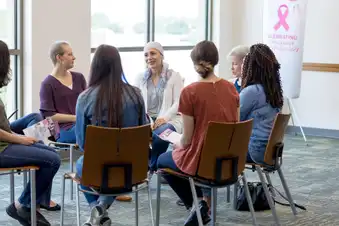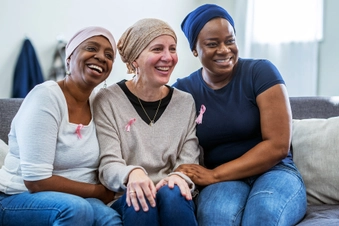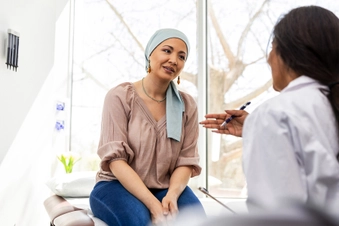Caring For Yourself With HR+/HER2- Breast Cancer with Mutations

Join a Support Group
Support groups – either in person or online – can be a lifeline when you're navigating uncertainty and emotions that come with HR+/HER- breast cancer. Connecting with others who know what it's like to live with your disease can be comforting and encouraging. Your doctor can point you toward groups that may be a fit for you.

Move Your Body
The American Cancer Society recommends exercising during and after cancer treatment. There are exceptions, such as when you have an active infection or elevated heart rate, so talk to your doctor. Find the type of movement that works best for you – whether exercising in water, walking in nature, or practicing yoga. Start slowly and build up to a regular routine that boosts your mood and overall well-being.

Make Personal Connections
Through support groups, you may make close relationships with others who also live with your cancer subtype. These kinds of one-on-one bonds help create a safe space for you to be vulnerable about your fears and frustrations. They also give you a chance to support someone else. That can feel gratifying during a time when you're accepting more help than usual.

Do a Self-Inventory
Sometimes it's hard to know what you need. Take some dedicated quiet time to think through how you're doing. Are you eating well? Sleeping well? Are there unhealthy habits or stressors in your life you could do something about? What makes you feel good? Make a list and work toward tending to the parts of your life that need it.

Practice Meditation and Guided Imagery
These mindfulness techniques calm your mind. Doing them regularly can help you relax, and reduce your stress, fatigue, pain, and depression. Many online resources can guide you through the practices, which involve being in the present moment, focusing on breathing, and letting go of judging your emotions.

Prioritize Rest
To get the most out of the times you feel good, give your body the rest it needs. Be realistic about what you can and can't do. Try to plan activities for your most energetic times of day. Also, keep regular sleep and wake times to help get enough slumber at night.

Don't Be Afraid to Ask for Help
Asking for help is a skill that takes practice for many people. If you usually wave off offers of help, instead think of concrete tasks you can name for those who step up. Think through your weekly to-do list: What could someone take off your plate?

Drink Plenty of Water
Hydration is crucial for your health, and that's especially true when you're in treatment or post-treatment for HR+/HER- breast cancer. Work toward a goal of eight to 10 eight-ounce glasses a day. Water is best, but now and then, you can change that to herbal teas, nonfat soy milk, or diluted fruit juices.

Educate Yourself
Learn what you can about your breast cancer subtype, but do so with care. Go directly to your doctor with questions and ask where to search for more information. Avoid online searches and stories of other people who may not share your circumstances.

Make Time for Things You Enjoy
What brings you happiness and contentment? Whether it's time with pets, chats with loved ones, a creative hobby, or listening to music, make enjoyment a deliberate part of your daily schedule.
Show Sources
IMAGES PROVIDED BY:
1) E+/Getty Images
2) E+/Getty Images
3) E+/Getty Images
4) DigitalVision/Getty Images
5) E+/Getty Images
6) E+/Getty Images
7) E+/Getty Images
8) E+/Getty Images
9) E+/Getty Images
10) 500Px Plus/Getty Images
SOURCES:
Cleveland Clinic: "HER2 Low Metastatic Breast Cancer: Finding Community," "HER2-Negative Breast Cancer."
Living Beyond Breast Cancer: "Exercise and Breast Cancer," "Methods of Self-care to Deal with Stress and Anxiety."
UCSF Health: "Breast Cancer Self-care and Recovery, Lifestyle Changes," "Meditation and Guided Imagery," "Hydration."
CancerCare: "Seeing Support for Metastatic Breast Cancer."